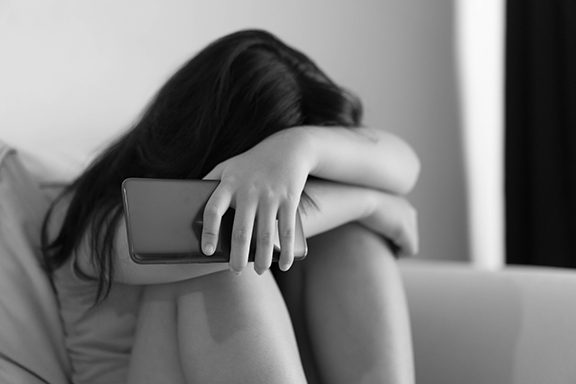Cooper: The Mind/Body Connection

It’s 2023, three years since the COVID-19 pandemic started. And yet today, many people still struggle with mental health issues either caused or worsened by the social disruptions the pandemic created in our lives.

Stephanie Ferroni
Psychiatric Nurse Practitioner
Cooper Care Alliance
“Initially,” says Stephanie Ferroni, a psychiatric nurse practitioner for Cooper Care Alliance, “depression, anxiety and OCD, especially those with contamination fears, were exacerbated during Covid. Social anxiety improved, though, because people didn’t have to go out, or they could wear a mask. But as the restrictions have decreased, social anxiety has started to worsen again. Many people are experiencing mental health issues. For every patient I see, I could see 10 more.”
“Very often, patients come in thinking they have a physical problem,” explains Jeffrey Mazure, DO, a Cooper Care Alliance primary care physician. “They may be feeling fatigued, or have difficulty sleeping or eating. They are not motivated to do activities they once enjoyed. I’ll say to the patient, ‘Look, we’re going to do a full workup, but I want you to leave open the possibility this could be a mood disorder. Depression and anxiety can cause your physical symptoms.”

Jeffrey Mazure, DO
Primary Care Physician,
Cooper Care Alliance
Dr. Mazure says primary care physicians are a good starting point for anyone who thinks they might need help. “Your primary care doctor is probably the best person to speak to initially. I have screening tools, and can do an assessment to make a clinical diagnosis.”
Once a patient is diagnosed with a behavioral health issue, there are numerous ways to help. “I always recommend some type of counseling, whether it’s individual or in a group setting,” says Dr. Mazure. “Lifestyle changes are also important, like healthy eating and getting enough sleep. It’s also important to increase your cardiovascular exercise – walking, playing a sport, riding a bicycle – because exercise increases blood flow and helps produce endorphins, which can reduce anxiety and increase a feeling of happiness. Then if I feel it’s necessary, I’ll recommend medication.”
“Time and time again, the best approach is a combination of lifestyle changes, therapy and medication,” says Ferroni.
“One of the things that is really unique about Cooper is our emphasis on the mind/body connection. If you close your eyes on a hot, sunny day and I describe a lemon and how bitter it is, your mouth is going to water. For sure, the mind can produce physical symptoms,” says Ferroni. “That’s why it’s so wonderful that we work closely with primary care doctors.”
Dr. Mazure notes that it is often a loved one who encourages a person to seek care. “People often are hesitant to come in, but I try to explain to the patient that, just like diabetes or high blood pressure, there is a cause for why you feel this way. The ultimate reason why people get these mood disorders is a biochemical imbalance in the brain. So speak up, share how you’re feeling, especially with someone you trust. No one should be afraid to get the help they need.”
Social media & your kids’ mental health (yours too)
Social media is a major trigger for the adolescent and younger population,” says Stephanie Ferroni, a psychiatric nurse practitioner for the Cooper Care Alliance. “My advice to parents is to follow your kids on social media, talk to them about it, and limit their time on it. Pay attention to what they’re doing and if, all of a sudden, they don’t want to play a sport they loved or they’re not coming out of their room, try to have positive interactions with them. Let them know they’re not alone, and that getting help is ok.”
And while you’re limiting your child’s digital exposure, you might want to do that for yourself. Ferroni says adults are also susceptible to depression and anxiety from their frequent screen time. “A lot of people think their life is awful because of what they see on social media. But how many people do you see on Facebook who look like they have the perfect marriage? And next thing you know, they got divorced,” she says. “You’ve got to police yourself. Watch what you’re exposed to. If you have anxiety after watching the news, don’t watch it 24/7. Don’t be absorbed in negativity. Seek out positive experiences and positive relationships. Do things that make you feel good.”



